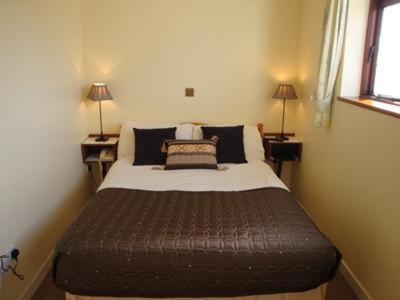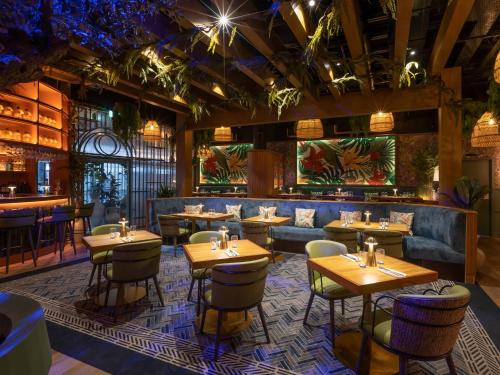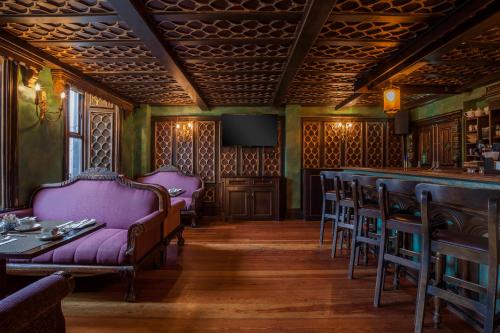Club Aras na nGael, Galway, Ireland
The pub looks like many others in Ireland – some people drinking, the taps of beer dominated by Guinness signs, and some friendly barmen standing behind them. But there’s a difference in this one that is noticeable straight away.
There are no signs in English.
Not the name of the pub, not the posters on the wall, not even on the doors to the bathrooms (which could lead to an embarrassing encounter, I’m sure!). Here in the Irish city of Galway, at Club Aras na nGael, everything is in the traditional Irish language.
“Irish occupies a very strange place in the Irish psyche because the majority of Ireland was Irish-speaking up until maybe 150 years ago,” barman Micheal O Leiohin tells me (after he’s poured me a pint).
“The great famine and years of immigration devastated the language then at the foundation of the state there were efforts to rejuvenate the language.”
Club Aras na nGael, tucked away through a gate and down a driveway, is part of the effort to help this rejuvenation. It’s a social place where people can come and speak in Irish to other people they know will appreciate the language.
The club has another location in Dublin where English language is not allowed at all but at this one, in Galway, they’re a bit looser with the rules because they like to encourage people who just want to find out a bit more about it.
Micheal (no, that’s not a typo) thinks it’s particularly important because the younger generation doesn’t appreciate the language like some of the old-timers do.
“It became compulsory in Irish schools and that really didn’t necessarily help the language because people saw it as being forced down their throats,” he explains.
“It wasn’t taught like a language, it was taught as a cultural tool. It wasn’t really taught as a language of communication but this can help you maybe reconnect with the culture.”
It’s no surprise to find a pub like this in Galway.
As Micheal puts it, “Galway city is situated right on the edge of the biggest Irish-speaking area in the country which is Connemara so there’s a big influx of Irish speakers here and it would be probably the most Irish speaking city in Ireland.”
Driving in earlier in the day, I was amused by the road signs and shops which had only Irish language on them. To be honest, it surprised me a bit.
Although I knew there was a traditional language here, I thought English would be pretty much the only thing anyone spoke.
Heritage is nice but the reality in many former British territories is that English has essentially committed linguistic genocide.
The latest census shows, though, that about 94,000 people still speak Irish as their daily language and another 1.3 million use it occasionally (including in classes at school).
That’s just over a quarter of the population. And Irish is still the first official language of the country, although in practice it’s not used for many official purposes.
“Personally I’m from an Irish-speaking area,” Micheal tells me.
“Not very strong, just my parents spoke Irish to me growing up and I love the language because I think it helps me connect with the people who’ve gone before us here and I think in terms of identity the strongest aspect of the Irish identity is the Irish language.”
“There are other aspects like music and dancing and Gaelic games but I think the language is the strongest part and I’m glad we still have it.”
THE BEST ACCOMMODATION IN GALWAY
I would recommend staying in Galway’s city centre, or down towards Salthill for some cheaper options.
BACKPACKER

There’s a friendly vibe at the fabulous Kinlay Hostel Eyre Square, which is conveniently located and has a good free breakfast.
BUDGET

The affordable rooms at Wards Hotel are part of a local pub, so you’ll get a true Irish experience here!
BOUTIQUE

The colourful Hyde Hotel is lots of fun but also offers a very comfortable and relaxing stay.
LUXURY

The historic building of the Skeffington Arms Hotel hosts large rooms in a prime location.
Time Travel Turtle was a guest of Stena Line, Paddy Wagon Tours and Discover Ireland but the opinions, over-written descriptions and bad jokes are his own.
Wow! I love this! It’s great to see how people try to keep culture. I’m surprised its still an official language. I guess you really do learn something new everyday 🙂
This is so great! So sad I didn’t know about the place in Dublin when I visited Ireland back in February:-( I’m a huge fan of minority languages and I fully support all the efforts to keep them alive!
I am planning to go to Ireland again… sometime in the near future. Galway could get on my list.
not even on the doors to the bathrooms (which could lead to an embarrassing encounter, I’m sure!) – Haha. Have you tried entering a girls’ restroom accidentally?
I appreciate that the Irish people love and preserve their own language. I wish we could also be like that here in our country.
I’ve never been to Ireland, but I’ve always wanted to go. When I was younger, I swore up and down I was going to go get my degree in Celtic archaeology and spend my years tinkering away the Gaelic ruins across Ireland, Scotland, Wales and England.
Ended up doing a little bit of that, but not yet in Scotland or Ireland. Great stuff, as always!
I loved listening to it. There is something somewhat romantic about hearing it, though like most languages I am sure it was mostly mundane communication.
Reviving languages is an interesting thing. It requires multi-generational support from people. A lot of stuff we destroy and we want to revive involves us just laying off. Languages requires active participation.